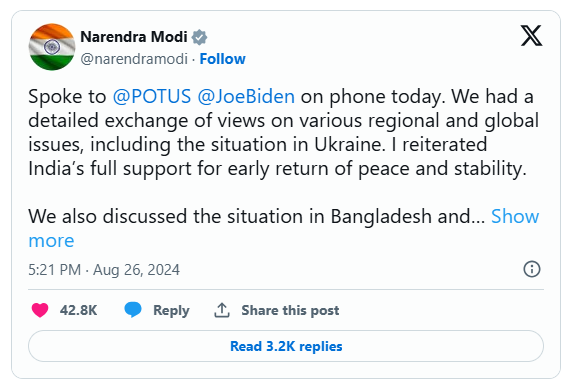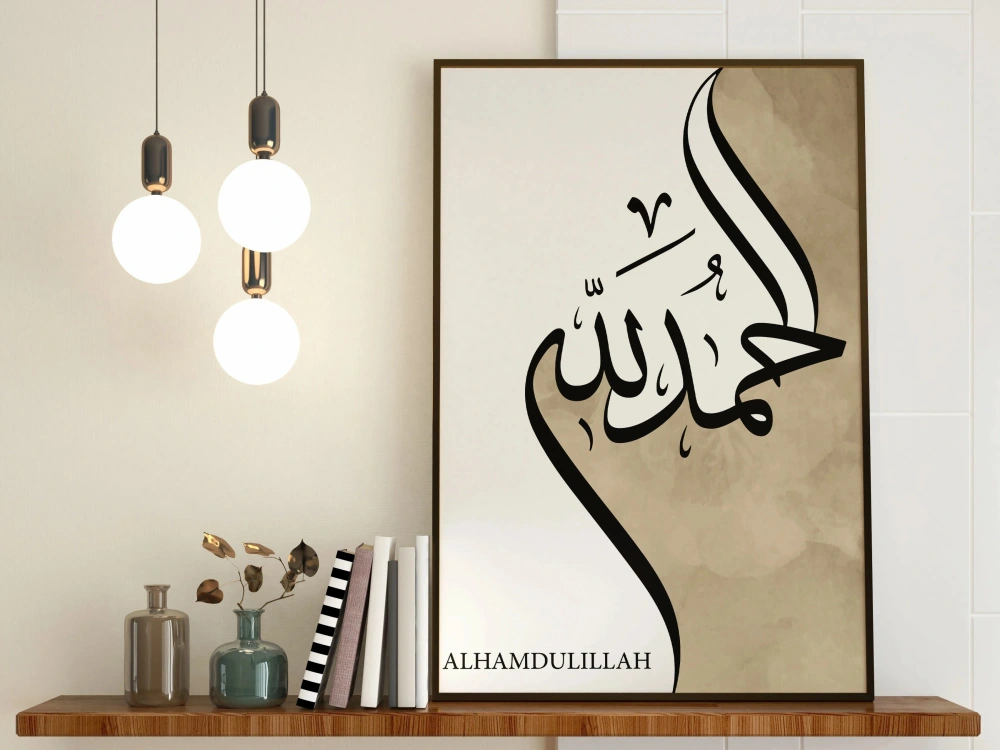On August 26, a tweet by Indian Prime Minister Narendra Modi on the social media platform X (formerly Twitter) drew significant attention. In his tweet, Modi claimed to have discussed the situation in Bangladesh with U.S. President Joe Biden. According to Modi, both leaders expressed concerns about Bangladesh and hoped for a return to normalcy in the country’s law and order. Modi also stated that he urged the United States to ensure the safety of the Hindu community in Bangladesh.

However, a statement released by the White House regarding the telephone conversation between the two leaders did not mention any discussion about Bangladesh. The White House statement detailed the topics covered during the call, stating: “President Joseph R. Biden, Jr. spoke today with Prime Minister Narendra Modi of India to discuss the Prime Minister’s recent trip to Poland and Ukraine, as well as the United Nations General Assembly meetings in September. The President commended the Prime Minister for his historic visits to Poland and Ukraine, the first by an Indian Prime Minister in decades, and for his message of peace and ongoing humanitarian support for Ukraine, including its energy sector. The leaders affirmed their continued support for a peaceful resolution of the conflict in accordance with international law, on the basis of the UN Charter. The leaders also emphasized their continued commitment to work together, including through regional groups like the Quad, to contribute to peace and prosperity in the Indo-Pacific.”
According to diplomatic observers, important matters discussed between top leaders are typically reflected in official statements. Therefore, whatever is disclosed in the government’s statement should be considered as the topics of discussion. If one leader raises a certain issue and the other does not agree, this disagreement is not usually mentioned in the official statements.
Modi, known for his Hindu nationalist stance, has faced similar criticism domestically for his handling of minority issues in India, especially regarding Muslims. In the last Indian election, Prime Minister Narendra Modi’s rhetoric was perceived by many as being directly against the Muslim community. This inflammatory language contributed to a climate of tension and hostility, leading to violence against Muslims by some of his supporters. Reports indicated that this violence resulted in several deaths and injuries, raising concerns about rising communal tensions and the safety of minority groups in India under Modi’s leadership. This has drawn significant criticism from both domestic and international observers who advocate for religious harmony and the protection of minority rights.
This discrepancy between Modi’s tweet and the official White House statement has sparked controversy. Critics argue that India, under Modi’s leadership, has been harboring the former Bangladeshi Prime Minister Sheikh Hasina, who has been accused of committing atrocities against the Bangladeshi people, including genocide. Hasina, who fled to India, is alleged to have used various means to destabilize Bangladesh, including leveraging elements she installed while in power. Despite these accusations, Modi has refrained from criticizing Hasina, even after her government was accused of killing 300 unarmed protesters. Instead, Modi’s administration reportedly sheltered several individuals involved in Hasina’s government.
In the wake of Hasina fleeing to India, an interim government led by Nobel Peace Prize winner Muhammad Yunus was established in Bangladesh. During this period, there were reports of attacks against minorities in the predominantly Muslim country, particularly targeting Hindus amid widespread protests.
Modi, known for his Hindu nationalist stance, has faced similar criticism domestically for his handling of minority issues in India, especially regarding Muslims. In the last Indian election, Prime Minister Narendra Modi’s rhetoric was perceived by many as being directly against the Muslim community. This inflammatory language contributed to a climate of tension and hostility, leading to violence against Muslims by some of his supporters. Reports indicated that this violence resulted in several deaths and injuries, raising concerns about rising communal tensions and the safety of minority groups in India under Modi’s leadership. This has drawn significant criticism from both domestic and international observers who advocate for religious harmony and the protection of minority rights.
Observers note that India’s actions have often been perceived as working against the interests of the Bangladeshi people, under the pretext of promoting the concept of a “united India.” Historically, India has been accused of supplying arms to various terrorist organizations operating in Bangladesh. Furthermore, several Indian media outlets have suggested that India is seeking to form an international alliance against Bangladesh’s interim government.









